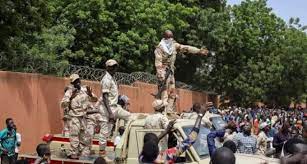ECOWAS Sanctions: Non-commission soldiers’ revolt over unpaid salary in Niger- Abdallah Musa
By Abdallah Musa
The economic and financial sanctions imposed on Niger Republic, following the overthrown of the democratic order in the country by military junta, is now negatively impacting on the payment of salaries of civil servants and military personnel in the country.
ECOWAS and its monetary organ-West African Monetary Union had imposed various forms of economic disengagements, which include the closure of land borders with Niger, with a threat of military intervention, if democracy is not restored in the country.
As a result of the biting effects of the sanctions, over 318 Non-Commission Officers (NCOs), being trained in the military institution in Agadez were said to have revolted on the 27th of August, due to the non-payment of their monthly training allowances.
Read Also: Resurgence of coups in Africa and the panacea-Hassan Gimba

Facts gathered from sources in Niamey stated that the non-commissioned officers turned against the management of the military establishment over the delay in their allowance, a development that prompted a captain, in charge of the institution to pull out his gun.
According to the sources, discontentment has continued to mount among the NCOs which is pushing them to become furious and frustrated.
Signs of discontent is said to surfacing within the Nigerien Armed Forces as many of the soldiers, and commissioned officers, have not been fully paid since the military junta took over power over a month ago.
In the same vein, most Nigerien commercial banks are said to be facing increasing challenges dealing with their customers, due to the inability to access to liquidity following the sanctions imposed by the Central Bank of West African States (BCEAO) which limits the disbursements to banks in the country.
Read Also: FAAN confirms fire at Lagos airport
The development is said to have forced the commercial banks to put in place withdrawal ceilings. Measures, a development that is occurring on the heels of a continued rise in the prices of basic commodities such as rice, milk powder, and sugar that have gone up by more than 15 percent as at the time of filing this report.
On taking over power, the coup leaders were said to have put an end to the single window system set up by Mohamed Bazoum to limit embezzlement of funds and corruption in the public administration.
As a result, revenue from customs and tax services is again paid into the public treasury account, which many Nigeriens feared would allow the junta to freely plunder public funds.
Read Also: JUST IN: ECOWAS rejects Niger junta’s transition period
There are also speculations that the junta could be seeking to obtain liquidity by any means, not hesitating to use force
The fear is coming against yet-to-be-verified information that the junta recently forced Sonibank of Niamey to give 500 million FCFA to the putschists who then used it to finance the demonstration on August 6 at the Seyni Kountché stadium.
As the sanctions continue to bite harder, the Malian junta led by Col. Assimi Goïta was said to have recently granted their Niger counterpart, financial assistance to the tune of approximately CFAF 55 million, to pay Nigerien civil servants and soldiers.
The Malian foreign ministers, Abdoulaye Diop, and finance minister, Alousséni Sanou, were reported to have handed the sum during their visit to Niamey on August 24, 2023, while, additional disbursements are being expected before the end of the month, September.
Read Also: President Tinubu; Your young Nigerian medical doctor is dying of chronic liver disease
Mali’s financial support to Niger is coming in the face of a worsening liquidity crisis which the country is being confronted with.
The Malian state is finding it increasingly difficult to collect money to build its own budget, and banks finding it difficult to provide consumer credit to individuals in the context of the financial crisis, the Malian junta is forced to put up for sale bonds and treasury bills, purchased in recent months by only fifteen Malian economic operators, banks and other countries in the region no longer wishing to subscribe to it.



Comments are closed.